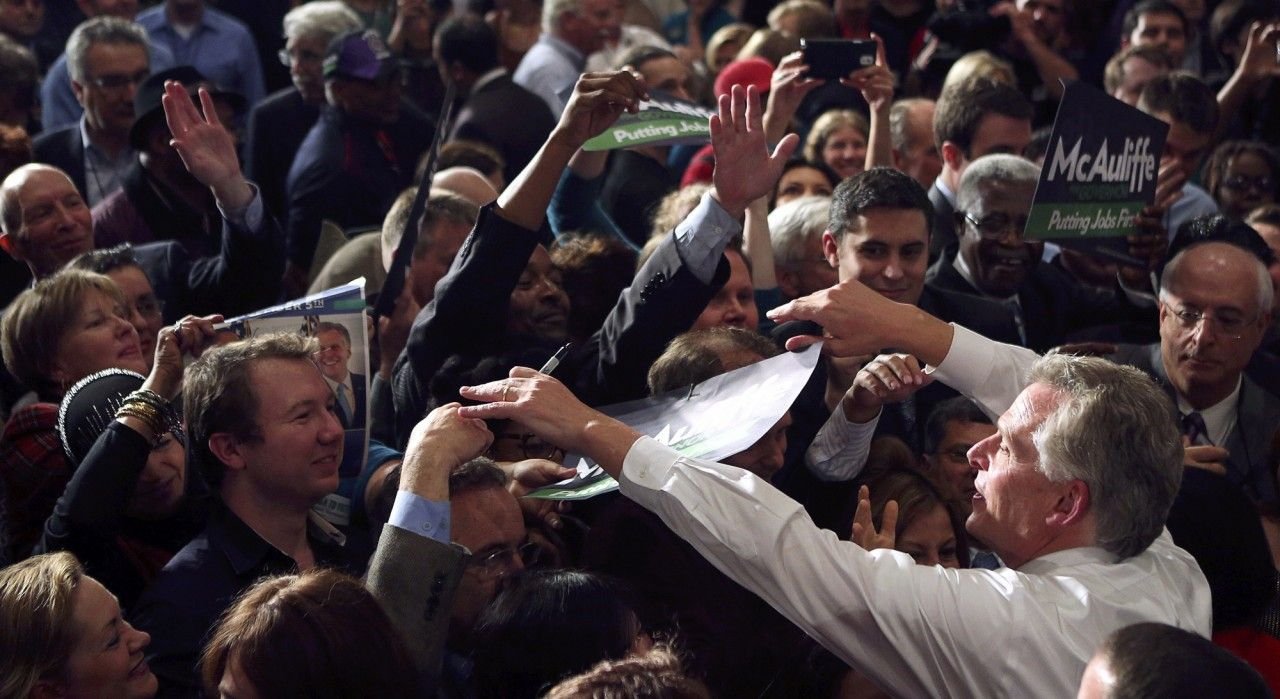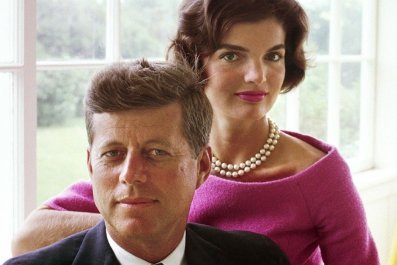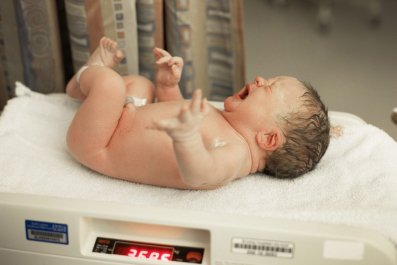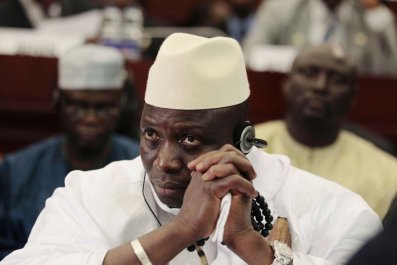It may be three years away, but the 2016 presidential election cast a long shadow over the races for governor in New Jersey and Virginia. Now the results are in, it begs the question: What does the re-election of a Republican governor in true blue New Jersey and the election of a high-profile Hillary Clinton ally in deep purple Virginia tell us about the next presidential contest?
On Tuesday night, the popular and larger-than-life Republican Governor of New Jersey, Chris Christie, trounced a little-known middle-ground Democratic state senator by winning over large swathes of women and minority voters who are typically wary of today's GOP, the party that largely caters to old white males.
Two hundred miles southwest in Virginia, Democrat Terry McAuliffe, a close ally of Hillary and Bill Clinton, eked out a victory over Tea Party favorite Ken Cuccinelli, largely by running up the score with single women.
To Republican strategists in Washington, these apparently contradictory results offer a clear picture of both how to win and who will win in 2016. A Republican governor who ran on a message of "compromise" and "bipartisanship" won reelection in a landslide by doing well among the demographic groups Republicans struggle with in nationwide elections.
Widely expected to mount a run for president in 2016, Christie's blowout on Tuesday was an object lesson in how Republicans across the country can regain the White House.
"It is [the Christie] campaign's goal to be able to tell a national story out of the election results in New Jersey on election day, as an example to the Republican Party," said Kevin Hagan, a Democratic strategist in New Jersey. Christie won 21 percent of African-Americans, 51 percent of Latinos and 57 percent of women. In New Jersey Romney won 38 percent of women and 4 percent of African-Americans.
Among the Republican establishment, Christie's message was heard loud and clear. "It shows the Republicans that if you can expand the tent of voters, you can go to great places," said Republican strategist Ford O'Connell. Those margins are "like Neil Armstrong walking on the moon if you're a Republican."
For his part, Christie used his victory speech Tuesday to portray himself as the antidote to the gridlock in Congress, an obvious - perhaps almost too obvious - positioning for a future presidential bid.
"Maybe the folks in Washington, D.C. should tune in their TVs right now, see how it's done," Christie said, to a roar of applause from his moderate Republican supporters. "I know that tonight a dispirited America, angry with their dysfunctional government in Washington, looks to New Jersey to say, 'Is what I think is happening, really happening? Are people really coming together? Are we really working African-Americans and Hispanics, suburbanites and city dwellers, farmers and teachers, are we really all working together?' "
That message, O'Connell said, was only made stronger by what happened in Virginia, where Cuccinelli, the Tea Party candidate, narrowly lost to former Democratic Party Chairman Terry McAuliffe in a race that pitted an ultraconservative Republican against a weak, widely distrusted Democrat. "What it shows you is if you want to win, regardless of the circumstances, you're going to have to get beyond the base," O'Connell said.
To ultraconservatives, however, Cuccinelli's narrow defeat means not that he had the wrong message that proved unattractive to anyone outside the ranks of the Tea Party but that he had the right message but nowhere near enough support from the Republican establishment.
Mitt Romney's failure to unseat President Obama a year ago set off a battle for the heart of the Republican Party that is threatening the GOP's ability to capitalize on Christie's success. The GOP fringe is totally at odds with the old-school establishment Republicans who traditionally fund presidential campaigns.
As Tea Party Patriots President Jenny Beth Martin said after Romney's failed campaign last year, "What we got was a weak, moderate candidate, handpicked by the Beltway elites and country-club establishment wing of the Republican Party. The presidential loss is unequivocally on them."
This sentiment reverberates through Tea Party circles and among conservative activists today: Mitt Romney lost because he wasn't conservative enough, because he compromised his principles.
Republican strategists see Christie's victory as a stark rebuttal of this often repeated theory. While Christie played up his willingness to compromise, conspicuously campaigned in minority communities, and spent the final day of the campaign on the trail with the Hispanic, woman governor of New Mexico, Republican Susana Martinez, Cuccinelli used a completely different playbook.
The last weekend of his campaign in Virginia, which until recently was, except for the spillover from the capital, a solid red state, featured a blitz of conservative stars coming in to stump for him, ending on Monday with a speech from former presidential candidate Ron Paul arguing for the pre-civil war doctrine of "nullification" - the right of states to reject legislation urged on them by the federal government. Exit polls in the Virginia race revealed that 52 percent of voters thought Cuccinelli was too conservative.
By the end of the night, both Christie and Cuccinelli had made history. Christie was the first Republican since 1985 to win the New Jersey governorship with more than 50 percent of the vote. Cuccinelli was the first Virginia gubernatorial candidate in 40 years to lose when the opposing party holds the White House.
The Tea Party, however, found more fault with Christie than Cuccinelli, blaming the latter's narrow loss on other factors: the Republican Party leadership's weak support for Cuccinelli; the government shutdown; the Democrats' accusation that Republicans are waging a "war on women."
Instead of questioning the electability of Cuccinelli's social conservative views - that included a court battle to keep Virginia's ancient anti-sodomy statute on the books - they cite his 45.5 percent to 48 percent defeat as evidence that a few more dollars for the underfunded candidate might have made all the difference.
"The GOP will take the lesson from Virginia that if they aren't suddenly socially liberal they're going to lose nationwide," conservative activist and RedState.com editor Erick Erickson wrote. Instead, he said the election was evidence that Cuccinelli's aggressive anti-Obamacare message trumped the war on women.
Christie's victory suggested that "electability should trump principle and belief," scoffed Fox News radio host Todd Starnes after the results were in. "It was a political philosophy also shared by the Romney campaign. And we all see how that worked out."
The two races leave Republicans still hotly debating which direction to move in: ever more conservative or more accommodating to the middle ground. For Christie, now almost certain to mount a run in 2016, convincing the Tea Party he is a winner will be a heavier lift than winning reelection in New Jersey ever was.
As Republicans struggle to come to terms with the meaning of the two elections, Democrats are all smiles about McAuliffe's win in Virginia. Having swung narrowly for President Obama in both 2008 and 2012, the question on Tuesday was whether Democrats could replicate that success in an off-year election, when younger voters stay at home and the electorate is older, whiter, and generally more conservative.
The McAuliffe campaign invested considerable resources to get out the vote and targeted their messaging at "drop off" voters who tend to fail to show up in the odd years between presidential elections. To do this, the campaign zeroed in on the issue of abortion, hoping to run up their margins among women in general, and unmarried women in particular.
It worked. Single women chose McAuliffe 67 percent to 25 percent, while exit polls showed abortion to be a top concern among 20 percent of Virginia voters. Cuccinelli's stridently anti-abortion and socially conservative positions - he even opposes abortion in cases of rape and incest, and his efforts to uphold anti-sodomy laws showed his lack of sympathy with gay Americans - only made McAuliffe's job easier.
It's a playbook that worked in 2012, now in 2013, and which Democrats will be sure to replicate in 2016. If Democrats have a woman at the top of the ticket in three years, the message will be even more powerful. Both Hillary and Bill Clinton - as well as President Obama - campaigned in person for their friend McAuliffe.
"Hillary's visit to Virginia really did create a lot of excitement for women voters," said McAuliffe's pollster, Geoff Garin.
More broadly, Garin sees McAuliffe's win as a powerful sign that Democrats' efforts to send out a clear and inviting message and their work to get their voters to the polls are working and will continue to work in 2016. That McAuliffe won an off-year election is "amazing," he said, citing McAuliffe's running on a fairly progressive agenda in what was until recently a solidly red state, opposing the National Rifle Association on gun control, supporting a woman's right to choose an abortion, and ultimately coming out in favor of the Environmental Protection Agency's new rules on carbon emissions, a big issue in Virginia. "I think this is a very positive election," he said.
Some Republicans saw the same writing on the wall in Virginia, particularly on the issue of women voters and social issues. GOP strategist Liz Mair warned that Republicans "had better watch it with the social issues positioning," particularly on hot-button fringe issues like sodomy. Republican consultant Ron Bonjean said his party must "immediately figure out how to effectively counter attempts to define them as anti-women before the presidential election begins."
So, where does that leave the parties? A piece of exit polling points the way.
Voters emerging from polling booths in New Jersey on Tuesday night were asked the following simple question: Chris Christie or Hillary Clinton?
While voters picked Christie for governor, they went with Clinton in the hypothetical White House battle 48 percent to 44 percent.
After Tuesday, Democrats are even more clear-eyed about how to make that hypothetical a reality. Moderate Republicans and big business Republican donors face a fierce fight with their ultraconservative base if they want to get Christie on the presidential ballot.
As the doyenne of conservative commentators, Peggy Noonan, explained to Clinton's former press officer George Stephanopolous on ABC on Sunday, "A lot of people may be cruising for a bruising here. Big difference between the Tea Party now and say 1964 and Goldwater or 1976 and Reagan, both wanted to seize and control and win over the Republican Party.
"The Tea Party now shows signs of not wanting to win it but of wanting to topple it over. Wanting to do away with it. That is something new in our politics. It's going to get fought out over the next few years."
























